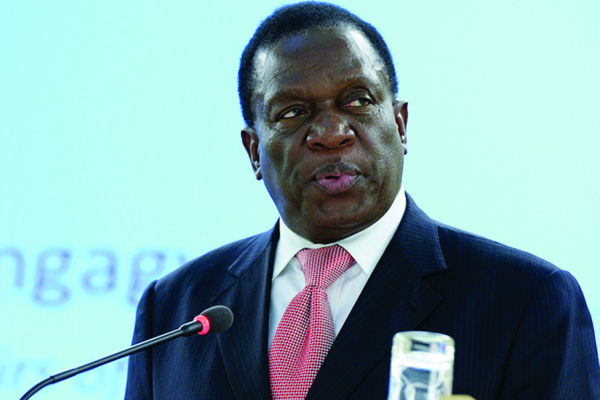
THE United States administration has challenged President Emmerson Mnangagwa to deal with his government’s economic mismanagement rather than blame the current economic mess on sanctions the global powerhouse imposed on Zimbabwe.
BY EVERSON MUSHAVA
The US has maintained sanctions on the southern African nation since 2001 through the Zimbabwe Democracy and Economic Recovery Act (Zidera) and sanctioned individuals and dozens of companies associated with the government.
Mnangagwa is among the 141 people and institutions that are still under the US sanctions, which were extended on July 25 this year, days before elections that gave the Zanu PF leader a five-year term.
Zanu PF and some observers have continuously blamed the sanctions for the deteriorating economic situation in the country, which they claimed were making it difficult for the country to access international lines of credit.
However, giving testimony before the US Senate Committee on Foreign Relations Subcommittee on Africa and Global Health Policy on Thursday, Deputy Assistant Secretary of State for Africa, senior fellow and Centre for Global Development executive director Todd Moss said the Mnangagwa administration should take responsibility for the country’s mess.
Moss said sanctions were not the reason Zimbabwe was not accessing lines of credit, but that Harare has not been servicing its international debt obligations.
“The government of Zimbabwe constantly complains that economic difficulties are the result of US sanctions rather than their own mismanagement and corruption,” Moss said.
Keep Reading
- Chamisa under fire over US$120K donation
- Mavhunga puts DeMbare into Chibuku quarterfinals
- Pension funds bet on Cabora Bassa oilfields
- Councils defy govt fire tender directive
“Blaming the US is just another example of a government failing to take responsibility for its own actions.
“The reason the government cannot borrow from international financial institutions is not because of US sanctions, but because the government has not paid its bills since 2001 and is now more than $5 billion in arrears to international creditors (about $2 billion to the IMF (International Monetary Fund) and World Bank, and roughly $3 billion to the US and other Paris Club creditors).”
He said although the US imposed “a modest programme of targeted bilateral sanctions on those who have undermined democracy”, these were not trade sanctions against the country.
Moss noted that there were no practical measures to address the economic situation in Zimbabwe, claiming the deteriorating economic situation “cannot be rescued by tweaking fiscal policy at the margins” as proposed in Finance minister Mthuli Ncube’s 2019 budget.
“The roots of the economic crisis are political. The solutions also must start with political reform,” Moss said, adding that until Mnangagwa dealt with the dominance of the military in the economy, the ongoing rackets of predatory elites and the flouting of laws, the country’s economy could not be fixed.
Moss, who visited Zimbabwe with a delegation of former US diplomats prior to the July 30 elections to assess the electoral field, said Zimbabwe has only witnessed less meaningful structural changes as Zanu PF continued to operate like a military junta.
He described Mnangagwa’s promise for political and economic reforms as a “poorly disguised charade”, and accused the 75-year-old Zanu PF leader of failing to put the country on a positive track after years of former President Robert Mugabe’s misrule.
The US government, Moss warned, should be very careful when dealing with the Harare administration, urging Washington to maintain the sanctions imposed on the country and withhold debt relief or new loans until significant reforms have been made.
Moss said the lack of good faith fundamentally undermined the credibility of the election, and both the European Union and the US missions found major shortcomings in the polls.
“Even the August 1 murder of six civilians in full view of the international Press and international election observers has been whitewashed. The government has, incredibly, even tried to blame the opposition for causing the violence when the TV cameras show soldiers shooting civilians in cold blood. This is not a government facing its mistakes or changing its behaviour,” he said.
Speaking at the same event, Deputy Assistant Secretary of State for Africa, Matthew Harrington said Mnangagwa’s government had tried to change, “but so far, the pace and scale of reforms has been too gradual and not nearly ambitious enough”.
Addressing the US Senate Committee on Foreign Relations Subcommittee on Africa and Global Health Policy, Zimbabwe businessman Joe Mutizwa, however, made a passionate plea for the removal of sanctions, claiming they were a great obstacle to Zimbabwe’s economic recovery.
“Furthermore, the country’s export competitiveness is adversely affected by negative perceptions of the country resulting in high country risk profile translating into higher country risk premiums,” Mutizwa said.
“Due to the above, the private sector in Zimbabwe finds it very difficult to access affordable external financing to retool and modernise plant and equipment and access technology.” The meeting was also attended by Ncube, who reassured the US that Zimbabwe was moving towards economic reforms, and also pleaded for support.











